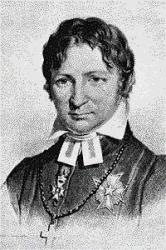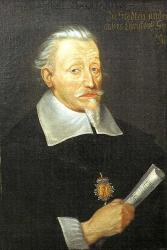Planning worship?
Check out our sister site, ZeteoSearch.org,
for 20+ additional resources related to your search.
- |
User Links
Person Results
P. C. Paulsen
1881 - 1948 Meter: 7.6.7.6.8.7.6 Translator of "The Lord To Thee Appealeth" in American Lutheran Hymnal Paul Christian Paulsen was born on March 26, 1881, in Alstrup, Jutland, Denmark.
He emigrated to America in 1904, was ordained in 1911, and served as a Lutheran pastor in Minnesota, Wisconsin, Illinois, California, and Alberta, Canada.
He died on July 26, 1948.
NN, Hymnary
P. C. Paulsen
James Moody
Meter: 7.6.7.6.8.7.6 Translator of "Great Joy and Consolation" in The Hymnal and Order of Service
James Moody
Johann Sebastian Bach

1685 - 1750 Person Name: J. S. Bach, 1685-1750 Meter: 7.6.7.6.8.7.6 Arranger of "HERR CHRIST, DER EINIG GOTTS SOHN" in Evangelical Lutheran Hymnary Johann Sebastian Bach was born at Eisenach into a musical family and in a town steeped in Reformation history, he received early musical training from his father and older brother, and elementary education in the classical school Luther had earlier attended.
Throughout his life he made extraordinary efforts to learn from other musicians. At 15 he walked to Lüneburg to work as a chorister and study at the convent school of St. Michael. From there he walked 30 miles to Hamburg to hear Johann Reinken, and 60 miles to Celle to become familiar with French composition and performance traditions. Once he obtained a month's leave from his job to hear Buxtehude, but stayed nearly four months. He arranged compositions from Vivaldi and other Italian masters. His own compositions spanned almost every musical form then known (Opera was the notable exception).
In his own time, Bach was highly regarded as organist and teacher, his compositions being circulated as models of contrapuntal technique. Four of his children achieved careers as composers; Haydn, Mozart, Beethoven, Mendelssohn, Schumann, Brahms, and Chopin are only a few of the best known of the musicians that confessed a major debt to Bach's work in their own musical development. Mendelssohn began re-introducing Bach's music into the concert repertoire, where it has come to attract admiration and even veneration for its own sake.
After 20 years of successful work in several posts, Bach became cantor of the Thomas-schule in Leipzig, and remained there for the remaining 27 years of his life, concentrating on church music for the Lutheran service: over 200 cantatas, four passion settings, a Mass, and hundreds of chorale settings, harmonizations, preludes, and arrangements. He edited the tunes for Schemelli's Musicalisches Gesangbuch, contributing 16 original tunes. His choral harmonizations remain a staple for studies of composition and harmony. Additional melodies from his works have been adapted as hymn tunes.
--John Julian, Dictionary of Hymnology (1907)
Johann Sebastian Bach
Frans Michael Franzén

1772 - 1847 Person Name: Frans Michael Franzen, 1772-1847 Meter: 7.6.7.6.8.7.6 Author of "Thine own, O Loving Saviour" in Hymnal and Order of Service Franzén, Franz Michael, was born at Uleabôrg, Finland, in 1772, and educated at the University of Abo, where he became Librarian and Professor of Literary History. He was subsequently Minister at Kumla, Orebro, Sweden, and then of Santa Clara, in Stockholm. He was consecrated Bishop of Hernosand, in 1841, and died there in 1847. (See Supplement to Longfellow's Poets and Poetry of Europe.) Of his pieces one is in English common use. It begins "Jesum haf i ständigt minne," translated by Mrs. Charles in her Christian Life in Song, 1858, p. 250, as "Jesus in Thy memory keep" (Looking unto Jesus). Usually it begins with stanza ii., "Look to Jesus, till, reviving."
--John Julian, Dictionary of Hymnology, Appendix, Part II (1907)
Frans Michael Franzén
Heinrich Schütz

1585 - 1672 Meter: 7.6.7.6.8.7.6 Composer of "WOHL DENEN, DIE DA WANDELN" in Glory to God Heinrich Schütz (baptized Oct. 9, 1585-1672) was the greatest German composer of the seventeenth century and the first to reach international prominence. His influence was felt for more than two centuries after his death.
In 1598, after hearing the young Henrich sing, the Landgrave Moritz of Hessen-Kassel began a campaign to have the boy study at Kassel. In 1599, Christoph Schütz took his son to the landgrave’s seat, where he served as a choirboy and pursued his education showing particular facility in Greek, Latin, and Frence. After he lost his treble voice, he set out for the University of Marburg, where he studied law. But under the sponsorship of the landgrave, Heinrich went to Venice (1609) and studied with Giovanni Gabrieli until Gabrieli’s death in 1612. In 1613 he returned to Germany, once again studying law while serving as organist to the landgrave. He was lent to Johann Georg I of Saxony (1614) and subsequently became director of the chapel, a position he held the rest of his life. The untimely death of his wife after six years of marriage (1625) led him to devote himself to the composition of church music. After several petitions Schütz was granted leave to study with Claudio Monteverdi and once again set out for Venice. For much of his life the Thirty Years’ War obstructed his work, and he spent time moving from court to court in Europe, finally settling in Dresden in 1641, where he died.
--The Presbyterian Hymnal Companion, 1993
Heinrich Schütz
Joel W. Lundeen
b. 1918 Meter: 7.6.7.6.8.7.6 Translator (st. 1) of "Around You, O Lord Jesus"
Joel W. Lundeen
Justus Gesenius

1601 - 1673 Person Name: J. Gesenius, 1801-1673 Meter: 7.6.7.6.8.7.6 Author of "When O'er My Sins I Sorrow" in Evangelical Lutheran Hymnary Gesenius, Justus, D.D., son of Joachim Gesenius, pastor at Esbeck, near Lauenstein, Hannover; was born at Esbeck, July 6, 1601. He studied at the Universities of Helmstedt and Jena, graduating M.A at Jena in 1628. In 1629 he became pastor of St. Magnus's Church, Brunswick; in 1636 court chaplain and preacher at the Cathedral in Hildesheim; and in 1642 chief court preacher, consistorialrath, and general superintendent at Hannover. He died at Hannover, Sept. 18, 1673 (Koch, iii 230-237; Allgemeine Deutsche Biographie, ix. 87-88; Bode, p. 76, &c).
Gesenius was an accomplished and influential theologian, a famous preacher, and distinguished himself by his efforts to further the catechetical instruction of the children of his district. Along with D. Denicke (q.v.) he edited the Hannoverian hymnbooks of 1646-1660. Both he and Denicke aimed at reducing the older German hymns to correctness of style according to the poetical canons of Martin Opitz; not so much interfering with the theology or making the authors speak a terminology foreign to them. Consequently their recasts, while setting a bad example, and while often destroying much of the force and freshness of the originals, were not by any means so objectionable as the recasts of the Rationalistic period, and moreover were soon widely accepted.
As no authors' names are given in the Hannoverian hymnbooks, it is difficult to assign the authorship of the new hymns and recasts therein contained. The following is generally, and apparently with reason, ascribed to Gesenius:
Wenn meine Sünd' mich kränken. Passiontide. His finest hymn as regards depth, warmth, and finish. First published in the Hannover Gesang-Buch 1646, No. 49, in 8 stanzas of 7 lines. It has been called a recast of the hymn "Hilf Gott, dass mir gelinge," but bears not the slightest resemblance to it. Included in Crüger's Praxis, 1656, and many later collections, as the Berlin Geistliche Lieder S., ed. 1863, No. 277. By a not unjust retribution it was soon recast, and appeared in the Lüneburg Gesang-Buch, 1661, as "Wenn mich die Sunden kränken." Translated as:—
1. When guilt and shame are raising. In full, by J. C. Jacobi, in pt. ii., 1725, of his Psalter Germanica, p. 4 (1732, p. 34). In the Moravian HymnBook of 1789, No. 106, it is altered to “O Lord, when condemnation"; and in the edition 1886, it begins with st. v., "Lord, let Thy bitter passion." A cento of stanzas ii., iii., v., from the Moravian Hymn Book, 1801, was adopted by Montgomery in his Christian Psalmist, 1825, beginning, "O wonder far exceeding," and this is in the New Zealand Hymnal. 1872.
2. 0 Lord, when my sins grieve me. A good translation of stanzas i., ii., iv., v., by A. T. Russell, as No. 81 in his Psalms & Hymns, 1851.
3. When sorrow and remorse. In full, by Miss Winkworth in her Lyra Germanica, 1st Ser., 1855, p. 74. A cento consisting of lines 1-4 of stanzas i., iv.—vi., and of stanza vii., rewritten to S.M., is in the Pennsylvanian Lutheran Church Book, 1868.
4. 0 Lord, when condemnation. A full and good translation, included as No. 84 in the 1857 ed. of Mercer's The Church Psalter and Hymnbook. Probably by Mr. Mercer, but mainly taken from the Moravian Hymnbook, 1789, and from Miss Winkworth. Repeated, abridged, in his Oxford ed., 1864, No. 149, and in the Toronto HymnBook, 1862.
5. When o'er my sins I sorrow. A good translation, based on her 1855 version, and omitting stanzas ii.—iv., by Miss Winkworth, as No. 48 in her Chorale Book for England, 1863. [Rev. James Mearns, M.A.]
-- John Julian, Dictionary of Hymnology (1907)
Justus Gesenius
Georg Blaurock
1491 - 1529 Meter: 7.6.7.6.8.7.6 Author of "Lord God! to Thee be Blessing" Georg Blaurock was one of the first Anabaptists. Along with Conrad Grebel and Felix Manz he co-founded the Swiss Brethren in Zurich. His real name was Jörg vom Hause Jakob (Georg from the house of Jacob) but was known by various names, including Georg Jakobie, and Bleurond and Weissmantel but he became best known as Georg Blaurock. He was born in 1491 in Bonaduz in Graubünden, Switzerland. He attended the University of Leipzig and served as a priest in the Roman Catholic Church. By 1524 he had left the priesthood; he came to Zurich at that time to meet with Ulrich Zwingli but he became interested in the more radical followers of Zwingli who rejected the mass, images, infant baptism and anything which did not have Biblical support. He was banished from Zurich four times. In 1529 he pastored a church in the Adige Valley in the Tyrol region in Austria He was arrested, along with Hans Langegger by Innsbruck authorities and burned at the stake, September 6, 1529. He wrote two hymns during his last three weeks of life: "Gott Führt Ein Recht Gerich" and "Gott, dich will ich loben," He made one significant convert, Jacob Hutter, who became a leader of an Anabaptist community. The community eventually moved to Russia and then the United States.
Dianne Shapiro, from Neff, Christian. (1953). Blaurock, Georg (ca. 1492-1529). Global Anabaptist Mennonite Encyclopedia Online. Retrieved 16 July 2017, from http://gameo.org/index.php?title=Blaurock,_Georg_(ca._1492-1529)&oldid=144843
Georg Blaurock
Svein Ellingsen
b. 1929 Person Name: Svein Ellingsen, b. 1929 Meter: 7.6.7.6.8.7.6 Author of "Seed That in Earth Is Dying" in Evangelical Lutheran Worship
Svein Ellingsen
Hans Thomissøn
1532 - 1573 Person Name: Hanz Thomisson Meter: 7.6.7.6.8.7.6 Composer of "FRANZEN" in Christian Classics Ethereal Hymnary
Hans Thomissøn


 My Starred Hymns
My Starred Hymns


